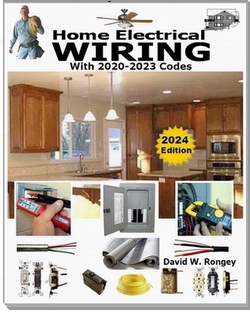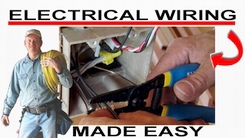Are You Making These Costly Electrical Wiring Mistakes
 '; ';
|
The Most Common Electrical Mistakes and How You Can Avoid Them: See the Most Common Mistakes that a Handyman or Homeowner will Make and What You Can Do to Have Your Project Turn Out the Right Way. © By: Dave Rongey |
Avoid These Costly Electrical Wiring Mistakes for Your Project
Electrical Wiring Question: How Can You Avoid Costly Electrical Wiring Mistakes when Wiring a Home?
- I’m wiring a electrical hot water tank.
- I have a 50 Amp wire to it out to the box where there is a white red and black and copper ground.
- Out of the hot water tank is only a red and black.
- Where does the white wire from the house hook up to?
This electrical wiring question came from: Nate, a Homeowner from Whittaker, Michigan
Dave’s Reply:
Thanks for your electrical wiring question Nate.
The Most Common Electrical Mistakes and How You Can Avoid Them
- Identify the Electrical Circuit Requirements
Unlike the newer 240 volt equipment such as clothes dryers and electric ranges which require these new circuits to be 3-wire plus a ground (2-hots,1-neutral and a ground) the conventional 240 volt electric water heater still only requires a 2-wire circuit (2-hots and 1 ground), and the circuit size is typically 30 amps. I suspect that newer more efficient technologies will be introduced which will require the presence of a neutral wire, but for now this is not the case. - Application Specific Details
As for your application, you have not provided enough information about your exact water heater (water tank?), and so my help back to you will be of the same level. That being said, seeing that you are a homeowner, you are either wiring a standard water heater or tankless, instant or on-demand water heater, the specifics are unknown. So although I do not like to make assumptions, in this case I will, so please read the following as it may apply to you and several other do-it-yourself homeowners.
Avoid These Costly Electrical Wiring Mistakes
The most common mistakes that a handyman and most do-it-yourself homeowners will make.
- The Failure to Plan
If you do not understand the exact circuit requirements for the equipment you are installing then you will most likely install the wrong wiring. - Unqualified Advice
You make pick up some second hand information from a non-professional and proceed by installing the wiring only to find out after all the hard work is done that you did it wrong. Unfortunately there is a plethora of free so-called “expert” advice out there coming from not only the internet, but also from the big-box hardware out stores. - Failure to Obtain a Permit and Inspection from the Local Building Department
One function of your local building department is to make sure that the project is done right according to national codes and local codes. Proceeding without contacting your local building department would be a big mistake. You should find that these people will be extremely helpful, if not contact the department manager and inform them that the unhelpful individual desires a permanent vacation. - Hiring Unqualified Individuals to Install Your Electrical Project
If you decide to hire someone to install your project then make sure they are qualified. Don’t rely on verbal information, ask for credentials and then validate the claims. A licensed electrical contractor who has liability insurance and has a history of satisfied customers is your safest choice. Most states have websites that contain information where state contractors can be found along with the status of their license including complaints and license validation. I also like seeing a website that has information about the company, contact information and a list of testimonials from people in the area who you may contact. - Unqualified Individuals Who Attempt to do The Work, But Do It Wrong
The reality is that many homeowners and handymen should not attempt to install some electrical wiring projects when they do not understand exactly what they are doing. The key here is to be honest with yourself, you must be the judge about every capacity you have to perform every step of the project and then be totally responsible for the results. An electrical project that is installed right will produce a sense of accomplishment, however one that is installed incorrectly could end up in disaster.
The Following Guide will Assist You
The following may also be helpful for you:
|
|
Be Careful and Be Safe - Never Work on Energized Circuits!
Consult your Local Building Department about Permits and Inspections for all Electric Wiring Projects.
More articles about Electrical Wiring and Home Electrical Wiring: |
|
| « Previous | Next » |
Connecting a Generator to a Home Videos |
Long Distance Electrical Wiring |














